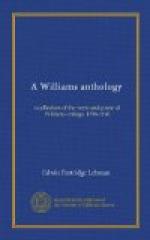As dean of the Faculty of Arts, Literature, and Science from 1892 till his accession to the presidency, he was in admirable training for that office. His facility in using his knowledge, his versatility of powers, fired by an innate energy, regulated by steadiness of purpose, and aimed at the highest ideals, make his name synonymous with efficiency incarnate. His modesty equals his ability. Harper stands as an heroic figure, a Napoleon with visions of educational conquest, selected by the far-seeing Rockefeller to build a university in the center of the nation and to give the West intellectual self-respect. With the same keenness of vision Mr. Rockefeller and the trustees selected as Dr. Harper’s successor a human figure, one in almost every way a contrast to Dr. Harper; an Elisha succeeding an Elijah and fitted to balance and round out the creative stage in a university to be not only the biggest but the best in the West. Williams as the mother of many educators must place the name of Judson beside that of Mark Hopkins.
VIII. CHARLES CUTHBERT HALL
SOLOMON BULKLEY GRIFFIN ’72
Dr. Hall was born in 1852, and died within a short time of two of his best and best-known college friends, H.L. Nelson and Isaac Henderson, on March 15, 1908. On being graduated from Williams in 1872 and from the Union Seminary, his first pastorates were spent in Newburgh, N.Y., and in Brooklyn, whence he was called to the presidency of Union Seminary in 1897. The most brilliant of his achievements was perhaps embodied in his two trips to India as the Barrows lecturer of the University of Chicago;—he had a wonderful aptitude in applying the principles of Christianity to an alien civilization. A class-mate, the editor of the Springfield Republican is the author of the tribute to his memory which follows.
* * * * *
It is around the thought of Cuthbert Hall the college boy, rather than the distinguished president of a great seminary and all the rest, with the world so much his parish, that any word of loving memory shapes itself. He was refined and winning. If ever the sunlight of a gracious nature touched any youth, it rested on him; the unworthy and the trivial passed him by. His adjustment of values even then was mature and firm. His literary taste and product were superior. He was a natural gentleman, and that meant a Christian by all the call of his nature. Love of the fine, the high, the genuine, and the generous, was instinctive. His breadth of charity and welcome for knowledge in youth became the distinction of his manhood.
Qualities were conspicuous in his life that bound worldlings to him in a bond of fellowship that grappled the best that was in them. Goodness of his sort is commanding—the practical power of a pure life is a pulpit asset that reenforces the spoken word beyond all human calculation. Under his leadership Union Seminary could not have been other than liberal and sympathetic toward devout scholarship that might seem to threaten the ancient foundations of faith.




